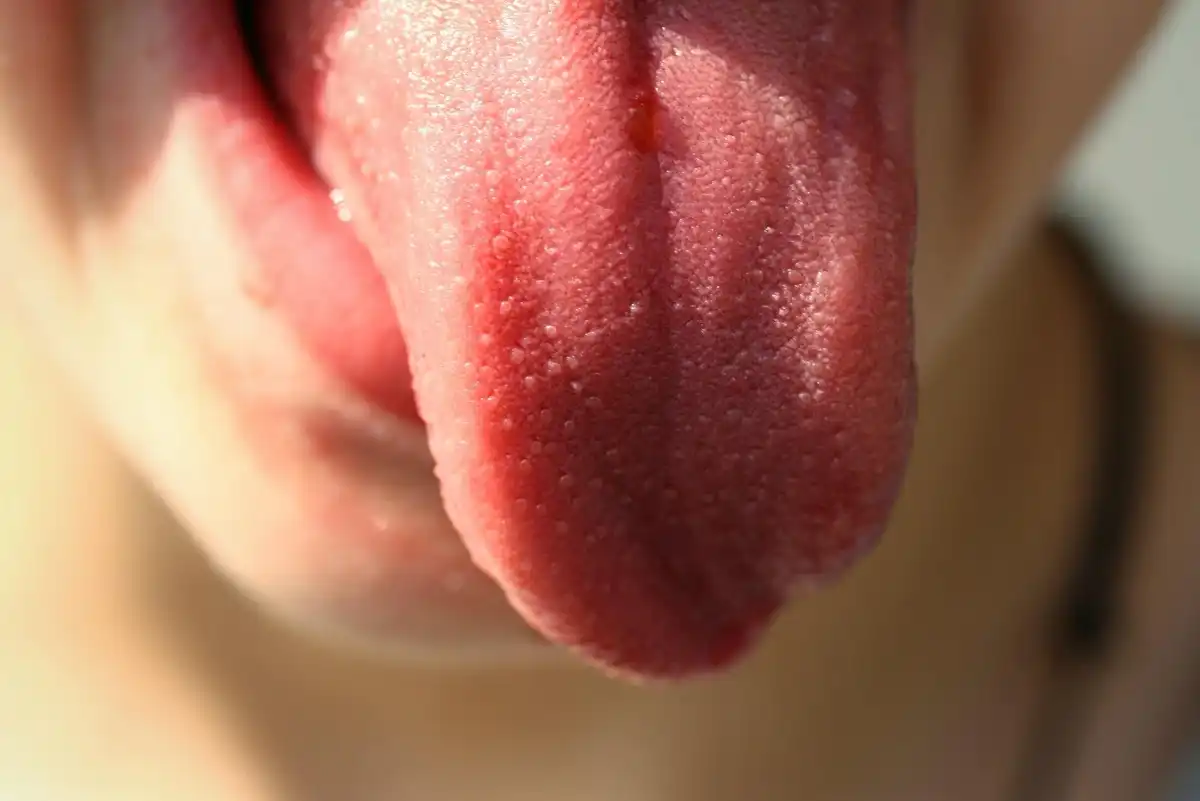7 Reasons Why Your Tongue Is Itchy: Causes & Treatments


Any time your mouth feels itchy, it tends to raise red flags. Some of the more common instances of an itchy tongue or mouth are associated with food allergies or a fungal infection like thrush. While some could be life-threatening and serious, other flareups involving an itchy mouth may be more irritating than problematic. The key is to listen to your body and pinpoint where the warning signs are coming from so that you can take steps to minimize discomfort.
Common Itchy Tongue Symptoms
When it comes to a breakout somewhere on your body, you might see something like hives or a rash flare-up with your other symptoms. But inside of your mouth, an itchy tongue may stand out from everything else.
Look inside of your mouth for signs of redness, speckled tissues, sores, or a white coating (that you may or may not be able to wipe away with a washcloth.) Are there any parts of your mouth that are swollen? If for any reason you’re having difficulty breathing or it seems as if your airway is closing off, seek emergency medical care immediately.
Make a mental note of what you ate recently, specifically within the last hour. Depending on whether your itchy tongue or mouth is caused by a food allergy, you might see symptoms right away or it may take a little while before they’re evident.
Itchy Tongue Causes
Aside from a serious food allergy, most causes of an itchy tongue or mouth are usually attributed to specific issues like:
1) Allergies Or An Allergic Reaction
Symptoms
An itchy tongue after eating or spending time outdoors could mean you were exposed to a specific allergen that you’re sensitive to. Allergies can develop over time and aren’t always something you’re born with. The itchiness might be restricted to your mouth, or whatever part of your body was exposed to the allergen. In some cases, your entire body will break out in bumps, rashes, or hives. Itchiness is one of the top signs of an allergic response.
Treatment
2) Hormonal Changes
Symptoms
Any time there’s swelling associated with your mouth, there’s a chance of an itchy sensation. Women tend to be sensitive to hormonal changes and occasionally their gums exhibit what looks like gingivitis. In reality, it’s a hormone-induced pseudo(fake) gingivitis that tends to go away after menses or pregnancy. Of course, the itchiness is more likely to exhibit itself around your gums than it is places like your tongue or the roof of your mouth. You might be experiencing “referred” symptoms where it feels like your tongue is itching, but it’s actually another part of your mouth.
Treatment
Check to make sure your oral hygiene routine is up to par. Gently brush along your gums and floss each day. It can take up to two weeks for true gingivitis to reverse itself. Otherwise, you should see symptoms improve as your hormone levels stabilize. Bottom line, don’t blame it on your hormones unless you notice a direct correlation on a month-to-month basis (in other words, see your doctor about it!)
3) Bite Or Injured On The Tongue
Symptoms
Your tongue is loaded with vascular tissues. So, when you accidentally injure it with food or by biting down on the side while you’re talking, there’s a good chance it’s going to bleed or feel extremely tender. It’s not uncommon to feel some itchiness around your injured site. The good news is that since your tongue is loaded with blood vessels, it can heal quite quickly!
Treatment
Take care not to chew on that side of your mouth. Avoid hard or crunchy foods for at least a few days. Take anti-inflammatory medication (like Motrin) if needed. You can also suck on an ice chip to help numb the injured area
4) Dry Mouth
Symptoms
Xerostomia (dry mouth) is usually a side-effect of prescription or over-the-counter medications. It’s also caused by conditions like auto-immune disorders, cancer therapy, or damage to saliva glands. When your mouth isn’t lubricated, it can contribute to “burning mouth syndrome”, which may in turn make your tongue or mouth feel itchy. It also raises your chances of getting cavities.
Treatment
5) Thrush
Symptoms
Thrush is a type of candida (yeast) infection. It’s common in people who have compromised immune systems or infants. With oral thrush there is usually a white coating that wipes off, revealing a bright red, raw tissue underneath. Thrush can also cause crusty or cracked areas at the corners of the mouth.
Treatment
Less Common Causes
Here are a couple of less frequent conditions that can sometimes cause tingling or itchiness in your mouth.
1) Canker Sores
Symptoms
Aphthous ulcers or canker sores tend to cause burning and tenderness inside of your mouth. However, it’s relatively rare to get them on top of your tongue. You might see them on the sides or underneath your tongue from time to time. The itchy sensation may not set in until a day or two after healing starts to set in.
Treatment
2) Herpes Or Other Viral Infections
Symptoms
Treatment
People with chronic flareups can get a cold sore prescription from their dentist. Or if you see a dental provider that offers laser therapy, try to get into their office on the same day that the tingling/burning/itchy sensation becomes evident. Early laser treatment can cut the life of the cold sore by half.
Preventing An Itchy Tongue
As with most dental health issues, prevention is key. If you’re someone who gets an itchy tongue from time to time, take care to watch your diet and practice exemplary oral hygiene. But even if you brush and floss every day, you might not be cleaning your tongue properly. If you look at it closely, the surface of your tongue is covered in hundreds, dare I say thousands, of tiny little papilla. Each of these papillae is like a tiny, fingerlike extension coming off of your tongue. Food debris and bacteria can get caught between them, raising your risk of an infection if you don’t clean them well.
So, what’s the best way to clean your tongue? Not with a toothbrush; with a tongue scraper. But just watch out…the first time you use one is going to blow your mind. Draw the scraper from the back of your tongue to the tip, using firm pressure. It may take a little practice before it feels like you won’t gag, but it will be well worth it! Then look at it…the buildup you cleaned off will blow your mind.
Side note: avoid using mouth rinse that contains alcohol. It can dry out your mouth and make symptoms of itchiness feel even worse!
Relief At Home
Brush, floss, and clean your tongue daily. If it’s a thrush or bacterial infection, you need to stabilize the oral flora inside of your mouth to get things back on track. Eating yogurt or supplementing with a probiotic won’t hurt.
If you suspect a minor food allergy, use an elimination diet to try to narrow down which foods you’re reacting to. Then, speak with your medical doctor about what happened. Just take note that food allergies can worsen with time and shouldn’t be dismissed.
Allergic reactions that involve overall itchiness or a flare-up in your mouth can sometimes be managed with an over-the-counter antihistamine. Although you can take the medication in a pill form, some dentists will have patients mix the antihistamine with an antacid to create a special mouthrinse that they coat their mouths in (but don’t swallow it; just rinse then spit it out.) If it’s not strong enough, ask your dentist about getting a prescription version of the same thing that contains lidocaine, AKA “miracle mouthwash.”
Overcoming An Itchy Tongue
One of the first things you should consider if you have an itchy tongue or mouth is a food allergy. Especially since anaphylaxis (oxygen deprivation) is such a serious risk. But if you know you don’t have a food allergy and are experiencing irritating symptoms of burning and itchiness, doing a bit of detective work can help you pinpoint the cause of your ailment. Then, take the appropriate steps or work with your dentist to find fast relief as well as a long-term solution that prevents symptoms from coming back.

Make your inbox smile!
Subscribe






